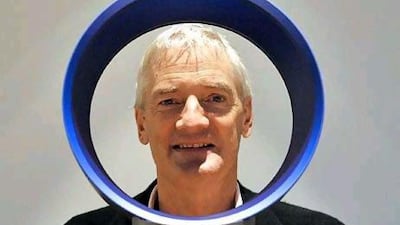The British billionaire inventor of the Dyson vacuum cleaner on Wednesday laid out the reasons why employees should be going back to the office, after nearly seven months of working remotely during the Covid-19 pandemic.
Britain went into total lockdown in March, closing the offices of thousands of businesses and forcing most of the country to work from home.
Although lockdown measures began easing in May, many offices remain partially or fully closed and have not welcomed back staff.
"We [Dyson] recognised right at the beginning [of the pandemic] – in late January and early February – whilst the shops are going to shut, our factories would close and we had to do something about it. So we took a decision to sell direct rather than sell in shops that were shut," Sir James Dyson told BBC Radio 4's Today programme.
The 73-year-old inventor said that unfortunately this led to Dyson changing its business model and making redundancies. The company – which also develops hand dryers, fans, heaters and lights – announced 900 staff lay-offs in July amid the pandemic.
Mr Dyson has previously said that people should not work from home because it is not where “the creativity happens” and on Wednesday he reiterated his claim.
“You need the interaction of other people to make progress and above all you can’t train people when you’re at home. I’m 73 and when I come into work I’m learning all the time, we’re learning from each other. You can’t train people and learn when you’re sitting at home,” he said.
UK Finance Minister Rishi Sunak conceded on Tuesday that despite the British government doing all it could to protect as many jobs as a possible, unemployment would likely rise as the furlough scheme finishes at the end of this month.
Mr Sunak created a new Job Support Scheme, which will replace the furlough scheme, but said only people in "viable" jobs would be allowed to use it.
Mr Dyson is Britain's richest man, worth an estimated £12.6 billion, according to the Sunday Times Rich List 2020.
Asked about how the UK can achieve economic growth amid the Covid-19 pandemic, he said: “Getting people back to work would be a good start.”
There has been talk of another national lockdown in the UK in a bid to control the spread of the coronavirus. Mr Dyson said that he would urge against further lockdown measures that could damage the economy.
“I’d never tell the Chancellor what to do and I wish him luck, but I think we’ve got to recover our economy, we’ve got encourage entrepreneurship and wealth creation,” he said.
“That’s the way out of this and it’ll be hard work but that’s what we’ve got to do.
“We should talk less about pubs and more about how we get people back to work and get entrepreneurs and businesses active again.”

Paying for your tea and toilet roll
Meanwhile, as homeworking has become commonplace since the pandemic’s onset, Dutch authorities are considering a policy that would lead to companies paying for their employees’ tea and toilet paper.
Officials are mulling the idea of paying around €2 a day to cover the coffee, tea and toilet paper used in work hours, as well as the extra gas, electricity and water, plus the depreciation costs of a chair and a desk. People working from the office would not be paying for these provisions under normal circumstances.
NIBUD, a family finances institution mainly funded by the government, is researching the extra costs of remote working.
“We have literally calculated down to how many teaspoons there are in an average household, so from there it’s not that difficult to establish the costs,” NIBUD’s Gabrielle Bettonville said.

